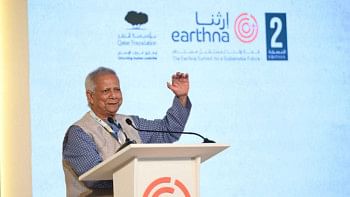Admin may get back judicial horns
The parliamentary standing committee on law affairs yesterday agreed in principle to recommend that the House reinstate the executive magistrates' power to take cognisance of offences.
Now scrutinising a bill to introduce laws on separation of the judiciary, it will come up with its recommendations next Thursday.
Before that, it will consult Prime Minister Sheikh Hasina on the matter.
“We are keeping in contact with the prime minister. I have talked to her today. If necessary, the state minister for law will meet and brief her in detail about the outcome of today's meeting,” Suranjit Sengupta, chairman of the committee, told reporters after a meeting at the Jatiya Sangsad Bhaban in the evening.
Leaders of judicial service, administrative cadres and police associations were present at the three-hour long meeting to air their views.
Replying to a query, Sengupta said the admin cadres' demand for reinstatement of the executive magistrates' judicial authority is under consideration.
However, another member of the committee said they have already agreed in principle to empower executive magistrates to take cognisance of some offences.
If everything goes as planned, the standing committee will propose some amendments to the Code of Criminal Procedure (amendment) Bill tabled in parliament to ensure continuation of separation of the judiciary.
Magistrates from the admin service lost the cognisance power in separation of the judiciary from the executive in 2007.
At yesterday's meeting, Bangladesh Judicial Service Association representatives strongly opposed the idea of reinstating the authority for admin cadres.
They said returning the judicial power to executive magistrates will amount to disobeying the constitution and Supreme Court's historic verdict on judiciary-separation.
“We want the bill to be passed as it is now,” Harun Ur Rashid, executive member of Bangladesh Judicial Service Association, told reporters.
Leaders of Bangladesh Administrative Cadres Association, on the other hand, said the executive magistrates need the authority to run the administration effectively.
“We have no objection to separation of the judiciary. We want the executive magistrates to be able to take cognisance of offences only in the interest of smooth running of the administration,” observed Abul Hossain, a member of the admin association.
He added that judicial magistrates would still be able to complete the trial proceedings.
At the meeting, representatives of police association demanded scrapping of the district magistrates' authority to take decisions regarding law and order in the metropolitan areas.
In the previous law, the power was delegated to police commissioners.
The committee assured the police of considering their demand.
Mentioning opinions of the three associations, committee Chairman Suranjit Sengupta said the bill would be modified for the sake of a dynamic administration.
“Opinions of the administrative cadres and police association are under our consideration,” he continued.
"We will place a report on the bill as soon as parliament returns from recess on March 15, and hopefully the bill will be passed in the current session."
Suranjit however said the committee would do nothing that may undermine the Supreme Court's verdict on separation of the judiciary.
In April 2007, the immediate past caretaker government promulgated two ordinances amending the Code of Criminal Procedure to separate the judiciary from the executive in line with the apex court's directives.
The ordinances took effect on November 1 that year.
Despite being recommended by the special parliamentary committee for ratification, they ceased to have effect on February 25, as they were not ratified within the stipulated time limit.
Later, the government placed a bill in parliament to enact laws necessary for continuation of the separation.
Since then, leaders of admin service have been lobbying hard to reclaim the power to determine acceptability of some offences to be sent for trial.

 For all latest news, follow The Daily Star's Google News channel.
For all latest news, follow The Daily Star's Google News channel. 



Comments